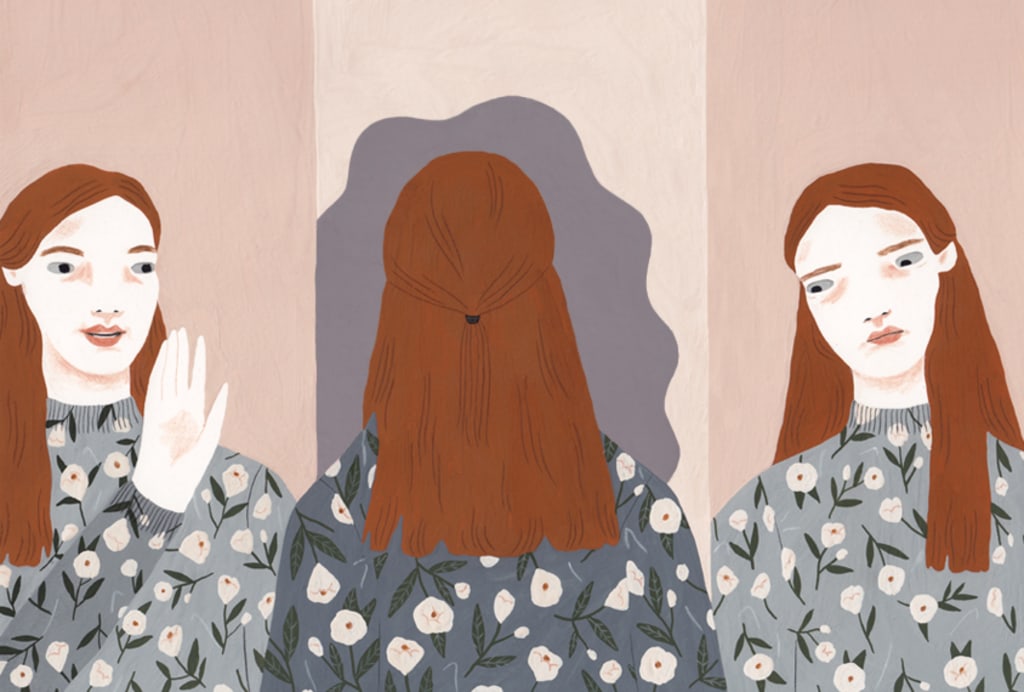Hidden in Plain Sight
An inside look at a woman on the Autism Spectrum and the merits of self-diagnosis

*This article may have sensitive topics associated with mental health conditions and neurotypical differences that may be triggering for some, including self-harm, suicide, mental illness, and sexual assault. Please read with caution. *
”Are you sure you’re autistic?” “You don’t seeeeem autistic.”
Ever since coming out as an autistic female, I’ve heard a lot for the same message. What does an autistic person look like? I didn’t know it looked like ME until I was about 24 years old. Another is the “You can’t be autistic unless you spend $2000 on a psych eval” comment. Autism is a neurotype difference and has no genetic or biologically based assessment measure. Taking the same assessment measure I would take in the office of an overpriced agency and using my hyper-focus, newfound special interest in autism research, and above average intelligence and attention to detail; I did my research and I did it THOUROUGHLY. There was hardly a piece of autism information I hadn’t set my eyes on (that’s an exaggeration of course, but you get what I’m stepping in). So YES I “self-diagnosed” after a year of careful observation, study, and eye-opening experiences that led to my discovery that I was indeed neurodivergent.
Maybe I WASN’T broken for finding tricks to not making eye-contact, self-harm, suicidal thoughts and plans, struggles with eanorexic type-behaviors, feeling lonely and like I never “fit” except in one very specially carved out group that probably saved my life, why too loud or too bright or too hot brought me to exhaustion, hands twitched or scratched or body moved side to side (see: stimming), why everything just seemed to be— too much. That was it, the best description of autism I have currently found, thanks to Jennifer Cook O’Toole’s book “Autism in Heels” (my new favorite book). All of it was just WAY too much!
Oh, and did I forget to mention the way I present is startlingly different than how your average male would present, according to the DSM? I studied the DSM-5 while in school and did countless research in female and non-binary presentations of autism was shocked to find that all of the research up u til recently has been done on cischet, white males (what a surprise, huh?). Even if I was to save the $2000 for a psych eval, HOW was I to accurately assess whether my money would be worth it or whether (like so many others I’ve read about) I too wouldn’t “qualify” when placed against male standards and uninclusive data.
I’ve always been “peculiar”, a “little professor”, a “nerd”, a little “shy” (terrified of most new social interactions with limited energy to keep up relationships). My little sister was diagnosed ADHD as a child after receiving countless tests and not speaking until after the age of three. “It’s certainly not autism”, they scoffed. “She doesn’t meet the criteria”. (OKAY, you caught me. I’m paraphrasing. I was five.) Now also suspected to have autism when looking at more female driven manifestations, we’ve talked a lot about our mis and undiagnoses up through our early and now mid-twenties for myself.
I, on the other hand, reading 400 page novels in the fourth-grade, “gifted”, Honor Roll— I wasn’t even on the radar. It wasn’t until I was 21 in my first year of grad school that I FINALLY sought help for the depression and anxiety I had held since at least 13 or 14 years old, maybe even earlier at 11 with the passing of my mom. Those years are blurry.
I used to walk all the way to the counseling center to turn around, unable to will myself to go in the building or even to call and make an appointment. Talk about paralyzing anxiety and social deficits. All anyone saw was a clever maneuver, “dang wrong way” I seemed to say to passers by as I was turning my body away, my ENTIRE body aching for help and being unable to ask for it.
It wasn’t until I sat on the ground with a bottle of pills in my hand that I knew I had to make a life or death decision. It’s the only thing that willed me out of my own social ineptitude and anxieties, and then I spent most of the first session doing breathing exercises so I could breathe long enough to get the words out in a semi-comprehensible manner.
I used to wonder what was wrong with me that everything, though outwardly I appeared fine, was so DAMN difficult. Simple executive functioning tasks like laundry or cooking a simple meal could be SO hard somedays. Other days I would find myself doing too much at once, only to be burned out again soon. No WONDER one of the most misdiagnosed conditions for autism is bipolar disorder (although you can have both).
I have a nack for forgetting where I’m going while driving. My husband often has to give me directions to places I know and have been to before because my short-term memory SUCKS. Doesn’t help either that I have aphantasia: an inability to see pictures in my head, but we’ll get to that in another article (It’s super rare and bizarre, just like me I suppose!).
I remember things like a friend’s birthday tremendously well (I love numbers and am fascinated by strings of information like this, but I’m terrible at math lol), but have difficult remembering where I put my glasses before I went to sleep. Autism is a bunch of contradictions and variety and never the exact same between variations of autistic people, although there is obviously some overlap.
I had the same idea that many do (wrong-myth-remove it from your brain!) that I couldn’t be autistic because I cared about other people. WOW was I wrong. I’m fact, I (as well as many autistic people, specially women and some non-binary people on the spectrum) actually have the ability to be MORE emotional and feel MORE of people’s emotions, just like we feel MORE of just about every other stimuli. Sometimes I can’t understand what someone is feeling by more subtle non-verbals (yesss I can tell the person throwing a chair through the window is PROBABLY angry lol) and don’t even understand how I’M feeling (see: alexythymia). I didn’t realize just how true some of these things were for me until my training as an intern therapist.
Sitting through supervision was always a panic inducer— would I get criticized for my inability to stop my stimming (self-stimulators behavior that I use, back then quite unknowingly to both calm and help express heavy emotions, which are omnipresent in the therapy room), my inability to pick up on a client’s non-verbals; or my inability to bring my tone, facial expressions, and non-verbals into harmony to convey consistent messages and appropriate empathy?
The most heartbreaking part of it might be how uncomfortable I felt going into each face-to-face session despite being there for a while with the expectation that my anxiety had faded. Only in my reduced anxiety at plans or procedures or process of therapy. I got better at masking in therapy, but regardless of how much I was able to fake it, I couldn’t keep doing it. I could always improve and get better at my craft, effectively masking more and more, but I would never truly feel happy and fulfilled here.
While I have yet to have $2000 thrown my way for an official diagnosis, I have found an important part of my identity I don’t plan on hiding anymore. Discovering I was autistic has and is still a confusing experience, but one marked with incredible joy at finally discovering this “secret”, locked away part (although not if you can spot the nuance and separate ewalitiies of a woman on the spectrum) of who I am. I am a proud autistic female/aspie/different human being and I’m enjoying so much of this self-reflection journey I get to keep going on.
In the end, I finished my degree in counseling and moved into a health coaching position with Noom, Inc. where I coach people into making and sticking to their individual health goals. I have also now started growing my own mental health & wellness coaching business, offering 30 and 60 min text-based coaching sessions. My goal is to improve access to and affordability of mental health care, especially for those with autism, anxiety, other mental or physical conditions that make speaking face to face or over the phone difficult or impossible, or those who are just more comfortable using a text-based medium. Mental health care is for EVERYONE, regardless of income; autistic, anxious, and those with accessibility concerns alike.
I would LOVE to meet you. My first 30 mins text session is only $10, money back if you are unsatisfied afte our chat. You can find out more about scheduling a coaching session and not miss out on more informative mental health content by following my insta @coach_lyndseyfisher ( Instagram.com/coach_lyndseyfisher ).
Thank you for letting me bear my soul to you. Take care of yourself today and everyday.
-Lyndsey Fisher, M.Ed. NCC






Comments
There are no comments for this story
Be the first to respond and start the conversation.